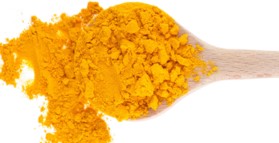 Turmeric absorption paradox solved
Turmeric absorption paradox solved
Posted on Wed, 18 May 16

Curcumin from turmeric is poorly absorbed, but still effective. Scientists now understand why.
Curcumin is one of the many phytonutrients in turmeric and has been under investigation for decades because of its health effects. Over the year’s research has shown that curcumin is poorly absorbed with relatively low blood levels after people take turmeric extract with high amounts of curcumin (1).
Paradoxically clinical studies of turmeric extracts have found it is effective despite low absorption. For example, it works just fine for ulcerative colitis (2), osteoarthritis (3), prevention of type-2 diabetes (4), premenstrual symptoms (5), depression (6) and Alzheimer's disease (7) without absorption-enhancers.
Why curcumin works despite low absorption is something of a mystery, but researchers may have an explanation. In a series of experimental studies they were able to show that curcumin is metabolized into a variety of other compounds after digestion and absorption, and that these metabolites were actually more effective than curcumin itself (8).
Specifically, the metabolites of curcumin were better at binding to receptors that reduce inflammation, had stronger anti-oxidant activity, and were better at reducing plaque build up in the brain, a feature of Alzheimer's disease.
“…our findings strongly suggested that the degradation products should make important contribution to the diverse biological activities of curcumin,” commented the scientists behind the study. “..we proposed that the degradation products curcumin are actually the main bioactive molecules in executing the biological activities of curcumin.”
Curcumin and turmeric containing dietary supplements increasingly use artificial emulsifiers to enhance their absorption. Beyond the adverse effects of these chemical additives, this research suggests that trying to achieve high blood levels of curcumin with absorption-enhancers may be the wrong approach.
References:
- Sharma RA, Euden SA, Platton SL, et al. Phase I clinical trial of oral curcumin: biomarkers of systemic activity and compliance. Clin Cancer Res. 2004 Oct 15;10(20):6847-54.
- Hanai H, Iida T, Takeuchi K, et al. Curcumin maintenance therapy for ulcerative colitis: randomized, multicenter, double-blind, placebo-controlled trial. Clin Gastroenterol Hepatol. 2006 Dec;4(12):1502-6.
- Kuptniratsaikul V, Dajpratham P, Taechaarpornkul W, et al. Efficacy and safety of Curcuma domestica extracts compared with ibuprofen in patients with knee osteoarthritis: a multicenter study. Clin Interv Aging. 2014 Mar 20;9:451-8
- Chuengsamarn S, Rattanamongkolgul S, Luechapudiporn R, Phisalaphong C, Jirawatnotai S. Curcumin extract for prevention of type 2 diabetes. Diabetes Care. 2012 Nov;35(11):2121-7. doi: 10.2337/dc12-0116.
- Khayat S, Fanaei H, Kheirkhah M, Moghadam ZB, Kasaeian A, Javadimehr M. Curcumin attenuates severity of premenstrual syndrome symptoms: A randomized, double-blind, placebo-controlled trial. Complement Ther Med. 2015 Jun;23(3):318-24.
- Yu JJ, Pei LB, Zhang Y, Wen ZY, Yang JL. Chronic Supplementation of Curcumin Enhances the Efficacy of Antidepressants in Major Depressive Disorder: A Randomized, Double-Blind, Placebo-Controlled Pilot Study. J Clin Psychopharmacol. 2015 Aug;35(4):406-10.
- Hishikawa N, Takahashi Y, Amakusa Y, Tanno Y, Tuji Y, Niwa H, Murakami N, Krishna UK. Effects of turmeric on Alzheimer's disease with behavioral and psychological symptoms of dementia. Ayu. 2012 Oct;33(4):499-504.
- Shen L, Liu CC, An CY, Ji HF. How does curcumin work with poor bioavailability? Clues from experimental and theoretical studies. Sci Rep. 2016 Feb 18;6:20872.
Tags: Curcumin, Turmeric, Dietary Supplements, Inflammation, Emulsifiers




